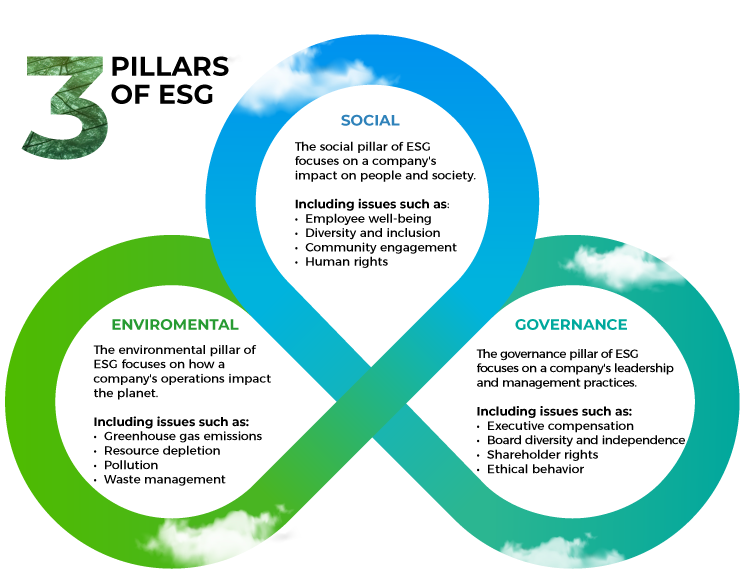
Take a closer look at how sustainable cloud solutions can be leveraged to create a more sustainable future for modern businesses.
Facing the possibility of irreversible climate change and a global economic downturn, sustainability has become a crucial aspect of sound business practices, with ESG principles taking hold worldwide. Many businesses are seeking ways to uphold their ESG goals while maintaining smooth operations throughout their organisation. Leveraging the cloud has emerged as a popular method to achieve this, but the process is more complex than it may seem at first glance.
How the cloud is revolutionising sustainable business practices
With the increasing amount of data being generated and processed, traditional data centres are becoming more and more energy intensive. These centres consume vast amounts of energy, resulting in a significant environmental impact, including carbon emissions, water usage, and e-waste generation.
Fortunately, cloud computing has emerged as a more sustainable alternative to traditional data centres. Cloud computing enables organisations to store, manage, and process data through remote servers accessed via the internet and by doing so, reduces the need for physical infrastructure, thereby minimising energy consumption and carbon emissions.
According to a study by the International Data Corporation (IDC), cloud computing can help businesses reduce their carbon emissions by 50-60%, compared to traditional data centres. Additionally, the study found that cloud computing can reduce energy consumption by 30-40% and decrease water usage by 80-90%.

The role of ESG in cloud computing
ESG – it’s the three-letter acronym on everyone’s lips, but what exactly does it mean? Before we can dive into the role ESG plays in cloud computing, let’s break it down. Essentially, ESG is a set of standards that measure a company’s performance on sustainability and ethical issues related to the environment, social responsibility, and corporate governance. By taking a holistic approach to ESG, companies can demonstrate their commitment to sustainable and responsible practices, which can improve their reputation, attract investors, and create long-term value for all stakeholders.
Take a look at the below diagram to better understand these three ESG pillars 👇

Understanding how ESG principles intersect with the world of cloud computing
Cloud computing is a critical component of both technological advancement and business growth, but its impact on the world cannot be overlooked. Therefore, it is essential for cloud providers to adopt ESG principles to promote sustainability and ethical decision-making. This includes visible actions such as committing to the usage of renewable energy sources, enhancing energy efficiency, reducing waste, supporting local communities, and respecting human rights. By integrating ESG principles into their operations and decision-making process, cloud providers can play a pivotal role in promoting sustainable business practices that contribute to a more equitable society.
Integrating ESG principles into operations and the decision-making process
ESG integration can help companies improve their risk management, boost their reputation, and attract more sustainable investors. It can also help create long-term value and make a positive impact on society.
Notably, customers are increasingly interested in buying from companies that are taking ESG considerations into account, largely because they want to know that their money is going to a company that is doing its part to make the world a better place. So how can companies integrate ESG principles into their operations and decision-making processes? This process involves defining clear targets aligned with ESG objectives and continuously tracking performance levels to measure progress over time. By engaging with stakeholders, cloud providers can gain valuable insights into areas that require improvement regarding ESG issues, which should be addressed promptly while upholding core values of diversity and inclusion. Additionally, they can extend these principles to all aspects of procurement by establishing ethical standards for suppliers and partners based on sustainability concepts.
At this point, you may be asking if cloud providers are actually taking this onboard and implementing ESG in their strategies. The answer is a resounding yes! In fact, many cloud providers have been vocal about their commitment to ESG and have taken concrete steps to integrate it into their operations.
Let’s take a look at what the major cloud providers are doing in this space:
Amazon Web Services (AWS), Microsoft Azure, Oracle, and Google Cloud Platform (GCP) have set ambitious goals to ensure their businesses positively contribute towards global environmental initiatives.
- AWS and Azure are committed to using 100% renewable energy by 2025, and both aim to achieve net-zero carbon emissions by 2040
- Oracle is already recycling and reusing 99.9% of retired hardware and has 100% of its European data centres powered by renewable energy
- GCP, which is already carbon-neutral, plans to run on carbon-free energy at all data centres by 2030

How exactly the cloud contributes to sustainability
While the cloud has long been associated with benefits like cost savings and flexibility, it’s also a powerful tool for reducing carbon emissions and promoting sustainability. This is achieved through various means, but for the purpose of this section, we’ll look at it from a cloud provider and business perspective.
Cloud providers
In addition to the initiatives taken on by cloud providers spoken to above, these providers are also making sustainable data centres a reality by using alternative power sources and offsetting their energy usage. Since cloud providers have the ability to operate at a larger scale, they can invest in more efficient and environmentally friendly data centres, reducing the overall carbon footprint of the IT industry.
Businesses
Companies can also use cloud computing to reduce their own environmental impact by optimising their IT infrastructure and reducing their reliance on on-premises data centres, which can be resource-intensive and costly to maintain.

Here’s how businesses can reduce their carbon footprint and promote sustainability:
- Energy efficiency: Cloud providers typically have data centres that are optimised for energy efficiency. These data centres are designed to use as little energy as possible while still providing reliable and high-performance services. By migrating to the cloud, businesses can take advantage of these energy-efficient data centres and reduce their energy consumption
- Server consolidation: Migrating to the cloud can also help businesses consolidate their servers and reduce the number of physical servers they need to operate. This in turn can help to reduce the amount of energy required to power and cool those servers, leading to further energy savings
- Shared resources: Shared resources in cloud computing help limit the carbon footprint of companies, while private and on-premises data centres become a thing of the past
- Remote work: The trend of remote work has been on the rise for several years. Cloud-based applications and services make it easier for businesses to adopt remote work policies, which can help to reduce transportation-related emissions from employee commuting. By allowing employees to work from home, businesses can also reduce their office energy consumption and lower their carbon footprint
- Sustainability reporting: Cloud providers often offer tools and resources to help businesses measure and report on their sustainability efforts. This can help businesses to track their progress, identify areas for improvement, and demonstrate their commitment to sustainability to stakeholders
Cloud success stories: Real-world examples of businesses driving sustainability with the cloud
At BBD, we’re committed to helping businesses achieve their sustainability goals through cloud computing. We believe that cloud computing can be a powerful tool for businesses to become more sustainable, and we’re passionate about working with our clients to create a better future for our planet. Take a look at how BBD provided a highly scalable and configurable application that can address future changes to regulation and allow for future technological agility.
Leveraging technology to drive ESG outcomes for the investment industry
Element22, a renowned management consulting and solutions provider dedicated to revolutionising data, data management, and analytics for the investment sector, has responded to investor demands for transparency by collaborating with BBD to create the ESGⁱ platform. This technology solution is designed to obtain reliable, verified ESG data for the investment industry, satisfying the needs of investors.
Objectives
- Design the system as an authoritative source
- Request, publish, challenge and amend ESG data in real-time
- Build trust through transparent, consistent business rules
- Assist in creating a community (as any firm can share their ESG data through the platform)
- Develop a system to support Sustainable Finance Disclosure (SFDR)
Approach
This project involved a thorough analysis of the client’s existing PoC solution, with a focus on identifying areas of improvement in functionality and technology. To achieve this, our in-house UX/UI team was brought in to redesign the application, making it more intuitive and user-friendly.
Using an Agile and distributed development approach, BBD delivered a highly scalable solution that includes a dynamic rules engine for calculations, reporting functionality for investment firms, automatic sourcing of ESG data, and portfolio management capabilities.
Watch our cloud promo video to find out how we are helping businesses harness the power of the cloud for greater efficiency, agility, and sustainability here.

There’s no doubt that the potential long-term benefits of cloud computing for environmental sustainability are significant, including reduced energy consumption, decreased carbon emissions, and increased adoption of renewable energy sources. By implementing ESG principles into their operations and decision-making, cloud providers can further contribute to sustainability efforts and make a positive impact on both society and the planet.
If you’re looking for a partner who shares your commitment to ESG and can help you leverage the power of cloud computing for your business while minimising your environmental impact, BBD is here to help. With our expertise in cloud enablement and sustainable practices, we can work with you to develop a tailored cloud strategy that aligns with your ESG goals and helps you achieve long-term success. Reach out to us.



